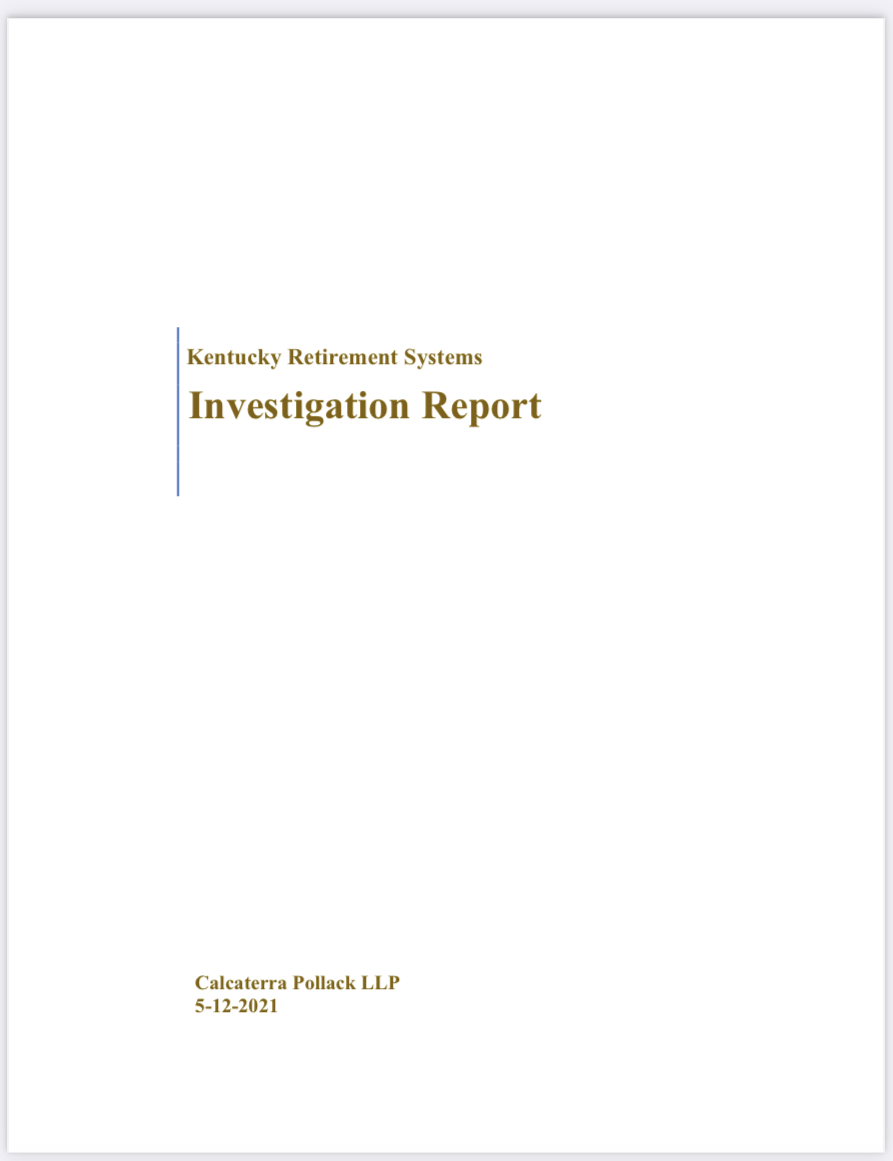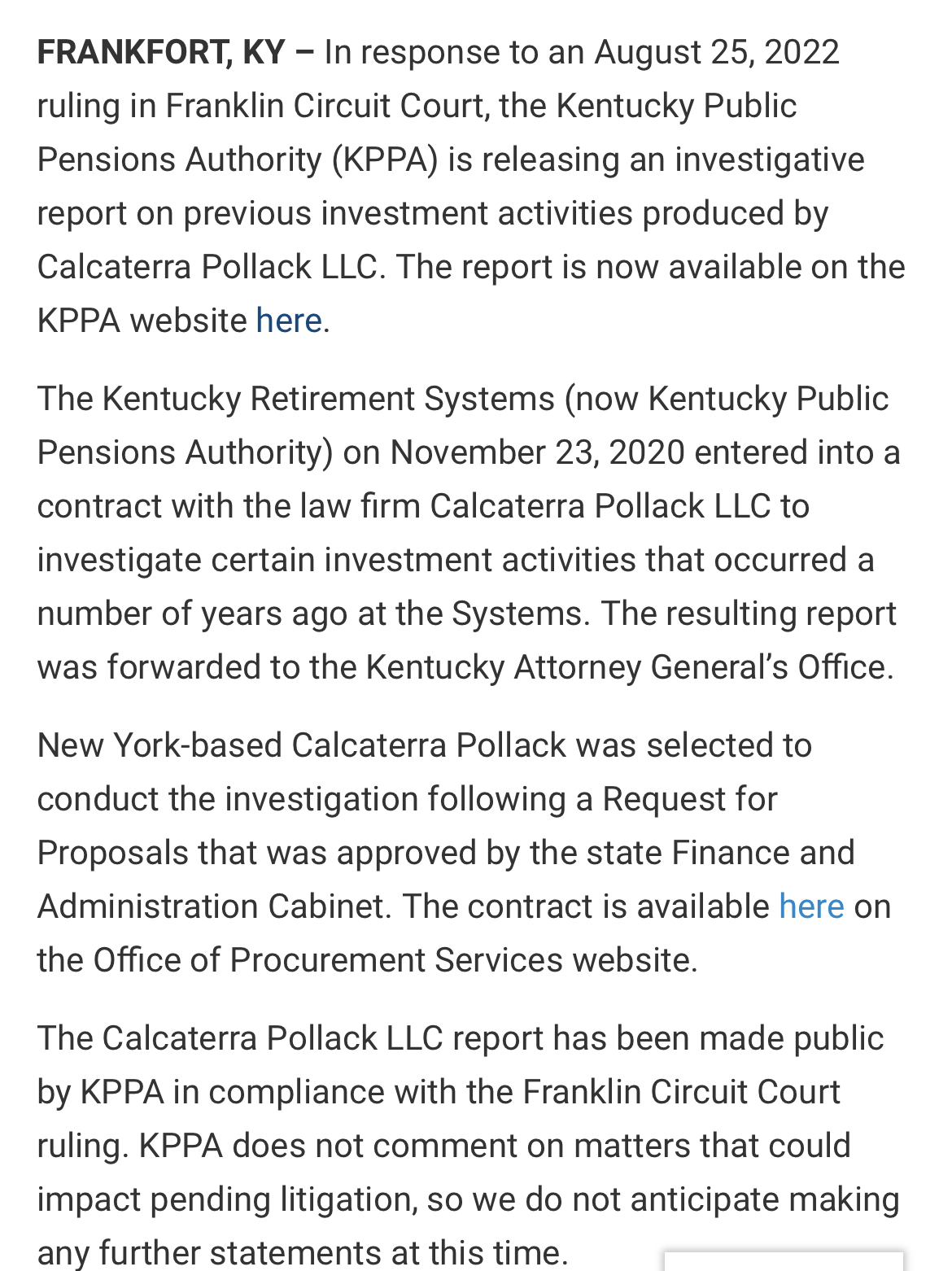

The Kentucky Public Pension Authority today released the $1.2M taxpayer funded Calcaterra Report. The fact-based report was generated by outside counsel, Calcaterra Pollack, LLP, at the conclusion of the New York law firm’s investigation into “specific investment activities conducted by the Kentucky Retirement Systems to determine if there are any improper or illegal activities on the part of the parties involved.”
A copy of the 2,256 page report can be accessed here: https://kyret.ky.gov/About/Documents/Calcaterra%20Pollack%20Investigati…
In an accompanying press release, KPPA indicated that it does “not anticipate making any further statements at this time.”
KPPA has vigorously resisted disclosure of the report, denying multiple open records requests over a span of 18 months.
But in companion August 25 Franklin Circuit Court opinions and orders, Judge Phillip Shepherd directed KPPA to make the report available to plaintiffs Jordan White and Glenn Cohen •as well as the public• within 10 days of entry of his orders.
Multiple factors, Judge Shepherd noted, “weigh[ed] in favor of disclosure. KPPA/KRS undertook a series of investments during 2011-2017, which the Kentucky Supreme Court acknowledged were clouded by allegations of ‘significant misconduct.’ It participated in a questionable bid solicitation process to contract with attorneys for a (second) investigation that cost taxpayers at least $1.2 million. Finally, after representing to the Court that the KPPA/KRS Investigation would be available to the public in some form, it refused any such access. Accordingly, under the KORA the public has a compelling interest in reviewing the KPPA/KRS Investigation to ascertain whether the agency acted ‘promptly, thoroughly and effectively.’”
That “compelling interest” ultimately turned on the fact that “[t]he public paid $1.2 million dollars for this Report. The public has a right to know its contents and decide if it got what it paid for.”
Questions remain.
Last week’s eleventh hour special meetings of the County Employees Retirement System (CERS) and the Kentucky Retirement Systems (KRS) — which oversees the Kentucky Employees Retirement System (KERS) and the State Police Retirement System (SPRS) — to discuss “litigation” in closed session yielded no KPPA vote and therefore no public resolution.
CERS and KRS deadlocked on disclosure on Thursday. CERS voted in open session to release the report, and KRS took no action on release of the report.
On Friday, KPPA publicly announced that it would take no action on release of the report at the conclusion of a 90 minute closed session — ostensibly confirming an internal schism.
The KPPA board’s unannounced decision to release the report sometime after these special meetings suggests that a quorum of the members of the KPPA board decided to disclose the report in a non-public forum in contravention of open meetings requirements as construed by the courts and the attorney general since the law’s enactment in 1974.
KPPA’s backroom decision to forego an appeal of the Franklin Circuit Court’s opinion precludes a much needed published appellate court opinion affirming Judge Shepherd’s conclusion that a public agency can “neither shield mere facts from disclosure nor convert them into materials that can be shielded from disclosure by engaging a law firm, at . . . taxpayer expense, to gather and summarize . . . facts.”
“Reducing these facts into summary form does not alter their fundamental character. Further, the act of hiring attorneys to create such a summary is not sufficient to confer protection under attorney-client privilege or work product doctrine.”
We are left to assume that a majority of KPPA’s board ultimately determined that the likelihood of a successful appeal of Judge Shepherd’s ruling was remote and that further efforts to evade accountability would manifestly disserve the public.
KPPA’s disclosure of the final, fact-based report is, in fact, long overdue.
The Franklin Circuit Court’s opinion provides a good road map for determining whether we got our $1.2M worth:
“The Court is concerned that [a] reluctance to ‘pursue unfavorable information or legal theories’ may have influenced the KPPA/KRS Investigation. Indeed, in reviewing the KPPA/KRS Investigation, the Court could see areas in which the report fell short of the comprehensive analysis of ‘improper or illegal activities’ purportedly sought under the contract. For example, an Advisory Services Agreement, which forms the basis for substantial, serious allegations by plaintiffs outside the Underlying Action, is mentioned only once [in] the KPPA/KRS Investigation. The Advisory Services Agreement itself, any amendments, internally-referenced side agreements, and any termination notice were omitted from the exhibits. In addition, fundamental assumptions in the report (e.g., that certain KPPA/KRS employees report to the Executive Director only on administrative matters) significantly narrow its focus and favor a limited investigation.
“In short, a full review of the CP Report gives rise to questions as to whether the purpose and intent of the CP Report was [to] fully expose all the relevant facts (and to determine if the KPPA and its employees made mistakes), or if the CP Report was commissioned to cover up or minimize those mistakes in an effort to convince the OAG to not pursue claims that could prove embarrassing to the current or former management of KPPA.”
Did taxpayers get what they paid for in the $1.2M Calcaterra Report?
Judge for yourself.


